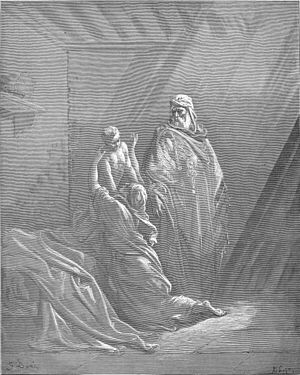 Image via Wikipedia
Image via WikipediaGod sent the prophet Elijah to Israel, the Northern Kingdom, to testify of His continuing
love for His chosen people. Though Israel embraced Baal, the God of Israel reached out to His people with miraculous signs wrought through Elijah. All that Elijah did was designed to draw the heart of Israel back to God.
During the reign of Ahab, the political climate of Israel was so hostile to God that Elijah was considered to be the enemy of the state. Ahab’s men routinely searched the country in order to assassinate Elijah.
After Elijah proclaimed a multi-year drought on Israel, a judgment for embracing Baal worship, God directed Elijah to hide in a ravine named Cherith, כְּרִית (Kĕriyth) in Hebrew. So, while Israel suffered the effects of a lengthy drought, Elijah was literally separated from it. In Hebrew, כְּרִית, cherith means separation. Every morning and every night, God directed ravens to bring Elijah meat and bread. Though Elijah, the prophet of God, knew of the judgment afflicting the nation, he, himself, did not suffer from it. God supernaturally protected him from it.
After the brook at Cherith ran dry, God sent Elijah to the household of an impoverished, single mother, a widow with a son. When Elijah greeted her, he gave the widow a choice: (1)give to him the first of her last bread, and God would not let her flour and oil to run out or (2) do as she initially planned: eat her last bread, and die. Since the widow’s statement of faith in God doesn’t appear until much later in the narrative, it would seem that she didn’t yet fully embrace God as her personal saviour. When she made the decision to share with Elijah the little that she had, she may have thought that she was dying anyway, so why not share? As the supply of flour and oil was miraculously replenished on a daily basis and she did not yet proclaim her faith in God, it seems that God was showing Himself to be extra patient and kind to this widow. God, in His mercy, allowed for her to loose sight of the fact that this provision of daily food was His blessing and a miracle. Was this widow also symbolic of Israel, who lived impoverished in her own land – spiritually languishing where God longed to give in abundance?
One day, the widow’s son became ill and died. In a reaction to his death, the widow turned on Elijah, effectively blaming him, and asking if an unrepented sin in her life brought about her child’s death. Elijah prayer and brought the widow’s son back to life. Then, when she saw her son alive, the proclaimed, “Now I know that you are a man of God and that the Word of the Lord from your mouth is true.” (1 Kings 17:24) The resurrection of her son changed her heart so that she could believe that the Word of God was true.
Throughout these chapters, God shows the extent to which He reaches out to Israel. Even though Israel sinned against God by turning away from Him, God in His infinite mercy and love, continued to reach out to Israel to show that He remains true to the covenant He established with Israel.
In yet another attempt to confirm His own existence to an unbelieving nation, God allowed a contest on Mount Carmel, between Him and Baal in the sight of Israel. While Elijah and the prophets of Baal each prepared a sacrifice, the winner was to be determined by which offering was to be miraculously consumed by fire from heaven. Of course, only Elijah’s water drenched sacrifice was entirely consumed by heaven’s fire.
With the frenzy of having realized that they had been deceived, the Israelites turned on the prophets of Baal and slaughtered them. When Israel cried out that the Lord is God, they turned to worship God. They understood that the drought was God calling them back to Himself. Only after Israel affirmed their faith in the God of Abraham, Isaac, and Jacob, and then massacred the prophets of Baal who led them into spiritual apostasy, did it rain.
Through Elijah, God demonstrated that no matter how much Israel wandered from Him, He still considered Himself to be the God of Israel. As such, God has promised to always protect Israel and to watch over His people, particularly as they live in the land He gave them.
Blue Letter Bible. "Dictionary and Word Search for Kĕriyth (Strong's 3747)". Blue Letter Bible. 1996-2011. 20 May 2011. < http:// www.blueletterbible.org/lang/lexicon/lexicon.cfm?
Strongs=H3747&t=KJV >
Strongs=H3747&t=KJV >

No comments:
Post a Comment